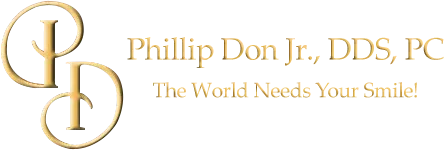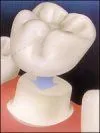Common Dental Conditions and Treatments
Bridge - A false tooth or teeth, known as a pontic, which is fused between two porcelain crowns to fill in the area left by a missing tooth or teeth. The two crowns holding it in place that are attached onto your teeth on each side of the false tooth. This is known as a fixed bridge. This procedure is used to replace one or more missing teeth. Fixed bridges cannot be taken out of your mouth as you might do with removable partial dentures. In areas of your mouth that are under less stress, such as your front teeth, a cantilever bridge may be used. Cantilever bridges are used when there are teeth on only one side of the open space. Bridges can reduce your risk of gum disease, help correct some bite issues and even improve your speech. Bridges require your commitment to serious oral hygiene, but should last as many as ten years or more.
Crown - Crowns are a type of dental restoration which, when cemented into place, fully cup over the portion of a tooth that lies at and above the gum line. In comparison, fillings are dental restorations that fill in or cover over just a portion of a tooth. Since dental crowns encase the entire visible aspect of a tooth, it in effect becomes the tooth's new outer surface. Crowns can be made out of porcelain (meaning some sort of dental ceramic), metal (a gold or other metal alloy), or a combination of both. Other terms that are used to refer to crowns are "dental caps" and "tooth caps. Crowns are generally used to restore a tooth to its original shape, to strengthen a tooth or improve the cosmetic appearance. Before & After Dental Photos - Dr. Phillip Don, DDS.
Decalcification is the loss of calcium from your bones or teeth. Tooth decalcification is caused by plaque buildup on tooth enamel. Eventually this will cause decay/cavities if oral care is inadequate. Braces may sometimes exhibit decalcification around the brackets.
Denture - A synthetic replacement for all of your teeth in either your upper or your lower jaw. Dentures help strengthen muscles controlling your expressions that require the support of your teeth, help with pronunciation problems caused by missing teeth. and aid with chewing.
Gingivitis is a common and mild form of gum disease that should not be ignored. It can be so mild, you may be unaware of the condition. It's important to take gingivitis seriously because it can lead to periodontitis. Periodontitis can cause tooth loss and may even increase your risk of heart attack and stroke. Women with periodontitis have been found to have a higher risk of giving birth to premature babies than are women with healthy gums. If your gums are swollen and bleed when you brush, you may have gingivitis. The most common cause of gingivitis is from improper oral hygene and lack of professional teeth cleaning . Daily brushing and flossing can help prevent gingivitis, however its usually not possible to thoroughly remove tartar by brushing and flossing alone - a professional dental cleaning every 6 to 12 months is recommended. If treated early, gingivitis may be alleviated.
Impacted tooth - Impacted teeth that are unerupted or partially erupted teeth that cannot fully erupt. The most important thing to know about impacted teeth is that they almost always require extraction. The longer the extraction is postponed, the longer the tooth roots grows. When the roots of an impacted tooth are allowed to develop, the risk of complication due to extraction increases significantly because the tooth roots may "wrap around" sensitive facial nerves. The teeth most likely to become impacted are the third molars, also known as "wisdom teeth."

Implant - An artificial tooth root to support restorations that resemble a tooth or group of teeth. Virtually all dental implants placed today appear similar to an actual tooth root and are placed within the bone. Dental implants can also be used to support a number of dental prostheses, including crowns, bridges or dentures. Dental implants are an ideal option for people in good general oral health who have lost a tooth or teeth due to periodontal disease, an injury, or some other reason. Implants do not rely on neighboring teeth for support.
Tooth Abrasion and Erosion - Abrasion and erosion are two types of damage that can wear away the tooth's outer covering, the enamel. Sometimes they also affect deeper parts of the tooth. Tooth abrasion is caused by something rubbing or scraping against the teeth. Brushing too hard is a common cause of abrasion. Toothpicks can cause abrasion. So can partial dentures or retainers that you can remove.
Chemicals such as acids cause tooth erosion, commonly the acids in citrus and other acidic foods. It can also be caused by medical factors such as a decrease in saliva, acid reflux, certain gastrointestinal conditions and the eating disorder bulimia. Even the chlorine and other chemicals in a swimming pool can cause erosion over time. Saliva contains calcium which helps to strengthen and re-mineralize the teeth, however, this cannot occur when a great deal of acid is present. Once the cause of the erosion or abrasion is found and stopped in early stages, the process usually ends. Additional treatment may be needed to fix the tooth and stop the symptoms if damage has progressed too significantly.
Tooth Sensitivity is a common problem that affects millions of people. Basically, tooth sensitivity means experiencing pain or discomfort to your teeth from sweets, cold air, hot drinks, cold drinks & food, and/or from brushing and flossing. The good news is that sensitive teeth can be treated. If you have sensitive teeth, consult with your dentist about treatment options and rule out specific dental problems. Your dentist might recommend a fluoride treatment to help strengthen the tooth enamel.
Dr. Phillip Don, DDS



